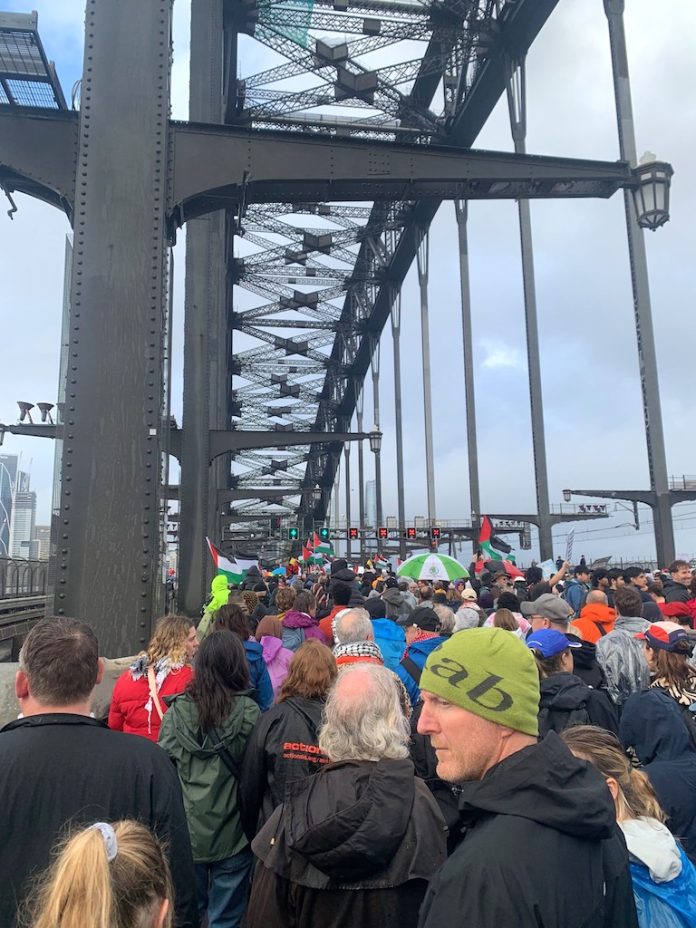
On August 24, Australia will witness its largest nationwide pro-Palestinian rally since the August 3 protest on the Sydney Habour Bridge demanding a ceasefire in Gaza. The demand is now more intense in the wake of the recent UN-backed IPC famine review committee finding that more than half a million people in Gaza are experiencing famine.
The UN has backed the finding which Israel has rejected claiming it is an “outright lie”.
Tomorrow’s rally will see every major Palestine solidarity organisation, with marches planned across Australia from Sydney to Melbourne, Perth and other cities and regional towns nationwide.
Several will be holding Palestine protests for the very first time.

This protest builds momentum on the massive Sydney Harbour Bridge protest which made world headlines with its 100,000 turn-out despite Sydney’s heavy rain. The Harbour Bridge Gaza protest went ahead despite state government and police opposition after the Supreme Court ruled in favour of the organisers and overturned NSW Police’s legal bid and Premier Chris Minns’ initial objection on safety grounds.
According to Joshua Lee, the Palestine Action Group’s organiser, the demonstration was “beyond their expectations”.
“[NSW Premier] Chris Minns said that today would be chaos,” he told the ABC.
“Instead, we saw a beautiful, inspiring outpouring of humanity, of the best of people.
“Everyone left in a calm fashion, feeling proud of what they’ve done today, emboldened to keep fighting for Palestine, that’s what today was.”
Participant’s reaction
Sidra Munene, who took part in the Harbour Bridge Protest, said she joined “right after getting off work”.
She was on the opposite side of the bridge when she arrived, which gave her a “great view and perspective”.
“At first, it really felt like a huge tidal wave of people was coming at me,” she said. “I was just overwhelmed by how exciting and electric everything felt.”
Munene described the protest as an “effective” and “powerful statement of solidarity”, pointing to the Prime Minister’s subsequent statement and plans as proof that the rally had forced his attention.
“There were a lot more kids than I expected,” she said. “It was a multi-cultural walk. The Muslim representation was big but there were also a lot of White Australians, Asian Australians and even Africans like me.
“We showed the people in power this is what we stand for, these are Australian values.”
Asked what motivated her, Munene said it was her empathy, referencing the rally’s chant “We are all Palestinian”.
“I think what that means deep down is that we are all human. We are all indigenous to some place in the world. We are all the same. In the rain, my mind went to all Gazans who were sitting in uncomfortable positions, and how much harder it must be for them to wade through the hardships of being bombarded.”
Munene said she hopes through her participation to tell the Palestinians in Gaza that “the humans on this planet are not forgetting them or ignoring them”.
“We stand with them through all these atrocities, and we’ll continue to scream and shout on their behalf when they can’t do it for themselves.”
Despite the rally’s impact, Munene acknowledged that more needs to be done and “it will take a long time and a lot of persistence”.
But she remained positive and called for more active participation in peaceful demonstrations.
“I am completely confident the activists in this country can withstand all the pushback,” she said. “We’ll still continue to show up in numbers, because it’s not just important how our head of states respond, but for the whole world to see what a nation like us is capable of achieving and spread the message to every corner of the planet.”


